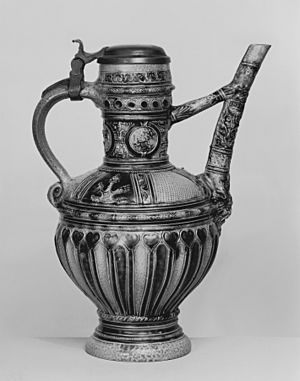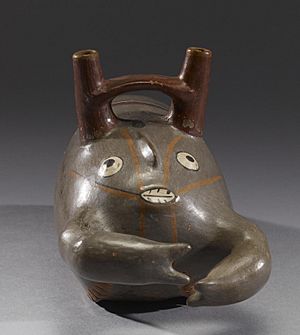Bridge-spouted vessel facts for kids
A bridge-spouted vessel is a special kind of jug or pitcher that was used a very long time ago. What makes it unique is a connecting part, like a "bridge," between its spout and the opening where you fill it. The spout is also a separate opening from the main filling hole. These cool vessels first appeared in ancient Persia and on the island of Crete.
Contents
What Are Bridge-Spouted Vessels?
Bridge-spouted vessels are ancient containers, usually made of pottery. They were used for holding and pouring liquids. Imagine a jug with a special design that helps you pour without spilling. The "bridge" connects the pouring spout to the main opening. This design was very clever for its time.
Early History and Where They Were Found
These interesting vessels first appeared in the Bronze Age or early Iron Age. This means they are thousands of years old! People in different parts of the ancient world created them. One of the earliest places they were found was in Persia, which is now Iran. They also appeared on the large Greek island of Crete.
Minoan Crete: An Ancient Example
On the island of Crete, archaeologists found a very old bridge-spouted bowl. This bowl was discovered at the ancient palace of Phaistos. It dates back to the Minoan civilization during the Bronze Age. This shows how early people were already designing complex pottery.
The Unique Nazca Design
There is another type of bridge-spouted vessel that looks quite different. This style comes from the Nazca culture in Pre-Columbian Peru. Instead of one spout and a bridge, these vessels have two spouts! Both spouts rise straight up from the body of the vessel. A bridge then connects these two spouts. This bridge also seemed to work as a handle for carrying the vessel. It's a very distinctive and artistic design.



